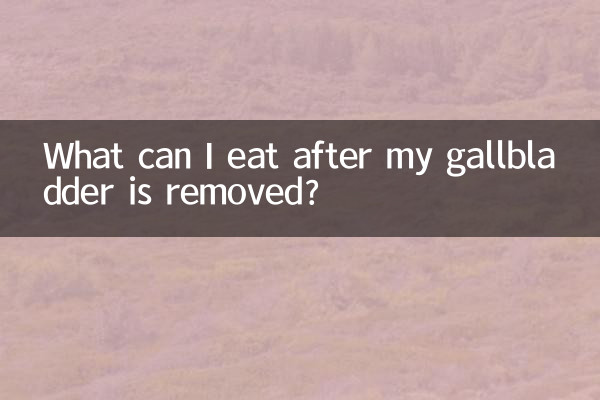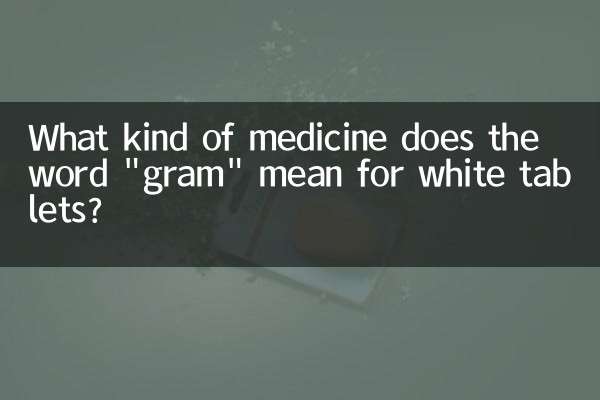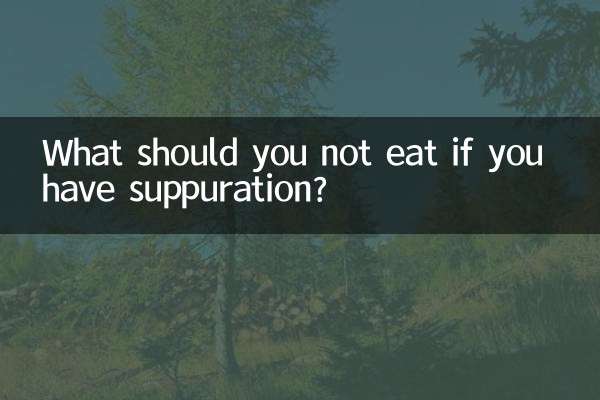What can I eat after my gallbladder has been removed? Postoperative dietary guidelines and analysis of hot topics
In recent years, surgery to remove the gallbladder (cholecystectomy) has become a common treatment for diseases such as gallstones and cholecystitis. With the advancement of medical technology, laparoscopic cholecystectomy has less trauma and faster recovery, but postoperative dietary management is still the focus of patients' attention. This article will combine the hot topics and hot content on the Internet in the past 10 days to provide detailed dietary suggestions for patients after cholecystectomy.
1. Dietary principles after cholecystectomy

The main function of the gallbladder is to store and concentrate bile to help digest fat. After cholecystectomy, bile is secreted directly from the liver into the intestines and lacks a concentration process. Therefore, patients need to follow the following dietary principles:
| stage | dietary advice | Things to note |
|---|---|---|
| 1-2 days after surgery | Fasting or liquid diet (such as rice soup, lotus root starch) | Avoid irritating the digestive tract and promote wound healing |
| 3-7 days after surgery | Semi-liquid diet (such as porridge, rotten noodles, steamed eggs) | Gradually increase the variety of food and avoid greasy food |
| 1 month after surgery | Low-fat, high-protein, high-fiber diet | Control fat intake to no more than 20-30 grams per day |
2. Recommended foods after cholecystectomy
According to popular discussions and expert advice on the Internet in the past 10 days, the following are the foods suitable for consumption after cholecystectomy:
| food category | Recommended food | effect |
|---|---|---|
| Staple food | Rice, porridge, steamed buns, noodles | Easy to digest, provides energy |
| protein | Lean meat, fish, tofu, eggs | Supplement high-quality protein to promote recovery |
| Vegetables | Spinach, carrots, pumpkin | Provide dietary fiber and vitamins |
| Fruits | apples, bananas, oranges | Supplement vitamins to promote intestinal peristalsis |
3. Foods to avoid after cholecystectomy
Postoperative patients should pay special attention to avoid the following foods to prevent diarrhea, abdominal distension and other discomforts:
| food category | Foods to avoid | reason |
|---|---|---|
| high fat food | Fatty meat, fried foods, butter | Increase the burden on digestion and easily lead to diarrhea |
| spicy food | Chili pepper, Sichuan peppercorns, mustard | Stimulates the digestive tract and affects recovery |
| high cholesterol foods | Animal offal, egg yolk, crab roe | Increase burden on liver |
4. Popular questions and answers and expert advice from all over the Internet
Based on hot topics in the past 10 days, here are some of the questions patients are most concerned about and their expert answers:
1. Can I eat eggs after gallbladder removal?
You can eat eggs, but it is recommended to steam or boil eggs and avoid fried or poached eggs. You can consume 1 egg per day in the early stage after surgery, and adjust according to digestion conditions in the later stage.
2. How long will it take to resume normal diet after surgery?
Generally, normal diet can be gradually resumed 1 month after surgery, but fat intake still needs to be controlled. It is recommended to adjust your diet under the guidance of a doctor.
3. What nutrients need to be supplemented after cholecystectomy?
Fat-soluble vitamins (such as vitamins A, D, E, and K) can be appropriately supplemented, because reduced bile secretion may affect their absorption. Please consult your doctor for specific supplement regimens.
5. Summary
Dietary management after cholecystectomy is key to recovery. Patients need to follow the principle of "low fat, high protein, and high fiber" and gradually adjust their diet structure. At the same time, according to your own situation, avoid high-fat and spicy foods and supplement nutrients reasonably. Through scientific diet, most patients can adapt to the new digestive pattern and return to normal life within 1-3 months after surgery.
If you have more questions about diet after cholecystectomy, it is recommended to consult a professional doctor or nutritionist to develop a personalized diet plan.

check the details

check the details